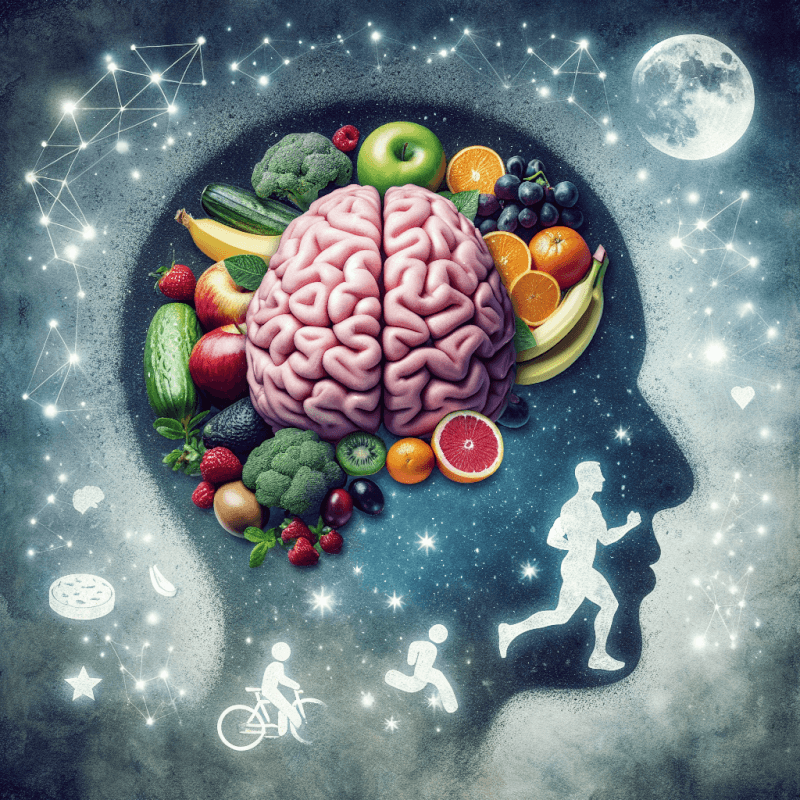Did you know that making small changes to your daily routine can significantly reduce your risk of developing Alzheimer’s and dementia? By adopting a healthy lifestyle, incorporating regular exercise, maintaining a balanced diet, staying socially active, and engaging in mentally stimulating activities, you can actively protect your cognitive health. In this article, we will explore the various lifestyle changes you can make to lower your risk of Alzheimer’s and dementia, empowering you to take control of your brain health and lead a fulfilling life.
Exercise and Physical Activity
Aerobic Exercise
Aerobic exercise, also known as cardio exercise, has numerous benefits for both your physical and mental health. Engaging in activities such as brisk walking, swimming, or cycling can help improve blood flow to the brain, increase oxygen and nutrient delivery, and stimulate the growth of new brain cells. Aim for at least 150 minutes of moderate-intensity aerobic exercise or 75 minutes of vigorous-intensity exercise per week.
Strength Training
Strength training exercises, such as weightlifting or resistance band workouts, play a crucial role in maintaining and improving muscle strength, which can positively impact brain health. Regular strength training helps protect against age-related muscle loss and increases bone density, reducing the risk of fractures. Incorporate strength training into your exercise routine at least twice a week, targeting all major muscle groups.
Balance and Coordination Exercises
Balance and coordination exercises are vital for preventing falls, which can lead to injuries and negatively affect brain health. Activities like yoga, tai chi, or balance exercises can enhance stability and spatial awareness. These exercises help strengthen the connections between different brain regions responsible for balance and coordination, maintaining cognitive function, and reducing the risk of cognitive decline.
Flexibility and Stretching Exercises
Flexibility and stretching exercises improve joint mobility, relieve muscle tension, and help prevent injuries. Incorporating activities like yoga or Pilates into your routine can improve overall flexibility and have a positive impact on brain health. These exercises promote relaxation, reduce stress, and contribute to a greater sense of well-being, which is essential for maintaining cognitive function.
Brain-Boosting Activities
Mental Stimulation
Engaging in mentally stimulating activities keeps your brain active and healthy. Reading books, solving puzzles, playing board games, or learning new skills like playing a musical instrument can help improve cognitive function and reduce the risk of Alzheimer’s and dementia. Challenging your brain with new information and tasks can strengthen the connections between brain cells, enhancing memory, attention, and problem-solving abilities.
Social Engagement
Maintaining healthy social connections is crucial for brain health. Interacting with friends, family, and participating in social activities can have a positive impact on mental well-being and cognitive function. Social engagement stimulates your brain, boosts your mood, and reduces the risk of loneliness or depression, which are associated with a higher risk of Alzheimer’s and dementia. Make an effort to regularly spend time with loved ones, join clubs, or participate in community events.
Learning New Skills
Acquiring new skills at any age is beneficial for brain health. Whether it’s learning a new language, painting, cooking, or playing a sport, engaging in learning can improve cognitive function and create new neural connections in the brain. Learning new skills challenges your brain and helps maintain its plasticity, reducing the risk of cognitive decline and keeping your mind sharp.
Engaging in Hobbies
Pursuing hobbies and activities you enjoy not only provides relaxation and enjoyment but also promotes brain health. Whether it’s gardening, knitting, playing chess, or dancing, engaging in hobbies reduces stress levels and stimulates the brain. These activities enhance cognitive abilities, improve memory, and provide a sense of purpose and fulfillment, all of which contribute to reducing the risk of Alzheimer’s and dementia.

Healthy Diet and Nutrition
Mediterranean Diet
Following a Mediterranean diet, rich in fruits, vegetables, whole grains, lean proteins, and healthy fats, has been associated with numerous health benefits, including brain health. This diet is high in antioxidants, vitamins, and minerals that support overall brain function and reduce the risk of cognitive decline. Incorporate olive oil, fish, nuts, seeds, and plenty of colorful fruits and vegetables into your diet to reap the benefits.
Brain-Boosting Foods
Certain foods have been shown to have a positive impact on brain health. Include foods like blueberries, spinach, broccoli, turmeric, walnuts, and dark chocolate in your diet. These foods are rich in antioxidants, vitamins, and minerals that protect against oxidative stress and inflammation, which are known to play a role in Alzheimer’s and dementia.
Omega-3 Fatty Acids
Omega-3 fatty acids, found in fatty fish like salmon, mackerel, and sardines, as well as walnuts and flaxseeds, have been shown to support brain health. These essential fats are crucial for maintaining the structure and function of brain cells and reducing inflammation in the brain. Aim to include omega-3-rich foods in your diet or consider taking a fish oil supplement if needed.
Antioxidant-Rich Foods
Antioxidants help protect the brain from damage caused by free radicals, which contribute to cognitive decline and neurodegenerative diseases. Foods rich in antioxidants, such as berries, dark leafy greens, tomatoes, and colorful fruits, help lower inflammation and oxidative stress, promoting brain health. Incorporate a variety of antioxidant-rich foods into your diet to nourish and protect your brain.
Quality Sleep and Rest
Establishing a Bedtime Routine
Creating a consistent bedtime routine can improve the quality of your sleep and support overall brain health. Establish a relaxing routine that includes activities like reading a book, taking a warm bath, or practicing relaxation techniques before going to bed. This signals your brain and body that it’s time to wind down and prepares you for a restful night’s sleep.
Creating a Sleep-Inducing Environment
Your sleep environment plays a significant role in the quality of your rest. Ensure your bedroom is dark, quiet, and at a comfortable temperature. Invest in a comfortable mattress and pillow that support proper spine alignment and promote restful sleep. Remove electronic devices and avoid stimulating activities in the bedroom to create a calm and sleep-inducing environment.
Avoiding Stimulants
Stimulants like caffeine and nicotine can disrupt your sleep and negatively impact brain health. Limit your intake of caffeinated beverages like coffee or tea, especially in the afternoon and evening. Avoid smoking or using nicotine products, as nicotine can interfere with both the quantity and quality of your sleep. Opt for caffeine-free herbal teas or warm milk as soothing alternatives before bed.
Managing Stress
Stress can significantly affect sleep quality and overall brain health. Find healthy ways to manage stress, such as practicing relaxation techniques, deep breathing exercises, or mindfulness meditation. Engaging in stress-reducing activities like yoga or Tai Chi can also help calm the mind and promote better sleep. Prioritize self-care and make time for activities that bring you joy and relaxation, reducing stress levels and supporting brain health.

Stress Management
Mindfulness and Meditation
Practicing mindfulness and meditation techniques can have a profound impact on reducing stress levels and improving brain health. Mindfulness involves being fully present in the moment, paying attention to your thoughts and emotions without judgment. Meditation techniques, such as focused breathing or guided visualization, help calm the mind and promote relaxation. Regular practice can reduce stress, improve mood, and enhance cognitive function.
Relaxation Techniques
Engaging in relaxation techniques like deep breathing exercises, progressive muscle relaxation, or aromatherapy can effectively reduce stress and promote a sense of calm. These techniques activate the body’s relaxation response, lowering heart rate, blood pressure, and levels of stress hormones. Find the relaxation techniques that work best for you and incorporate them into your daily routine.
Yoga and Tai Chi
Yoga and Tai Chi are holistic practices that combine physical movement, breath control, and meditation. These ancient practices have been shown to reduce stress, improve flexibility and balance, and promote overall well-being. Regular participation in yoga or Tai Chi classes can enhance brain health by reducing anxiety, improving focus, and boosting cognitive function.
Music Therapy
Listening to music can have a powerful impact on reducing stress and promoting relaxation. Music has the ability to evoke emotions, trigger memories, and improve mood. Choose calming and soothing music to listen to before bed or during times of stress. Engage with music that brings you joy and helps you unwind, supporting brain health and overall well-being.
Social Connections
Maintaining Friendships
Maintaining strong friendships and social connections is vital for brain health. Regularly engaging with friends or loved ones promotes a sense of belonging, reduces loneliness, and enhances overall well-being. Make an effort to nurture existing friendships and build new relationships by scheduling regular get-togethers, phone calls, or video chats. Social connections provide mental stimulation and support, reducing the risk of cognitive decline.
Joining Social Clubs or Organizations
Joining social clubs or organizations that align with your interests or hobbies can provide opportunities for social engagement and mental stimulation. Find groups or clubs in your community that share your passions or explore new interests. Engaging with like-minded individuals can foster connections, broaden your social network, and support brain health through social interaction and shared experiences.
Volunteering
Volunteering not only benefits others but also positively impacts your own brain health. Giving back to your community fosters a sense of purpose and fulfillment, reducing stress levels and improving overall well-being. Find volunteer opportunities that align with your interests or skills and dedicate your time to supporting a cause you care about. Volunteering promotes social connections and mental stimulation, contributing to brain health.
Attending Community Events
Attending community events, such as festivals, fairs, or lectures, offers opportunities for social interaction and mental stimulation. Explore your local community calendar and make an effort to participate in events that interest you. Engaging with your community not only promotes social connections but also exposes you to new ideas and experiences, keeping your brain active and reducing the risk of cognitive decline.

Brain-Healthy Supplements
Omega-3 Fish Oil
Omega-3 fish oil supplements can provide an additional boost to brain health. They contain high levels of the essential fatty acids EPA and DHA, which are crucial for brain function and development. Omega-3s have been shown to reduce inflammation, improve memory, and support overall cognitive health. Consult with your healthcare professional to determine if omega-3 fish oil supplements are appropriate for you.
Vitamins B12 and D
Vitamins B12 and D play essential roles in brain health. Vitamin B12 is involved in the production of red blood cells and the maintenance of healthy nerve cells. Vitamin D supports brain function, mood regulation, and enhances calcium absorption, promoting bone health. Ensure you’re getting enough of these vitamins through dietary sources or consider taking supplements if advised by your healthcare professional.
Turmeric and Curcumin
Turmeric, a spice commonly used in curry dishes, contains a compound called curcumin, which has potent anti-inflammatory and antioxidant properties. Curcumin has been shown to protect brain cells from damage, reduce inflammation, and improve memory and cognitive function. Adding turmeric to your meals or taking curcumin supplements can provide potential brain-boosting benefits.
Ginkgo Biloba
Ginkgo biloba is an herb that has been used for centuries in traditional medicine for various purposes, including brain health. It is thought to improve blood flow to the brain, enhance memory and cognitive function, and reduce oxidative stress. However, it’s essential to consult with your healthcare professional before considering ginkgo biloba supplements, as they may interact with certain medications.
Smoking Cessation and Alcohol Moderation
Seeking Professional Help
If you’re a smoker and want to reduce the risk of Alzheimer’s and dementia, seeking professional help to quit smoking is vital. Healthcare professionals can provide guidance, support, and recommend cessation programs or medications that can enhance your chances of success. Quitting smoking has numerous benefits for overall health, including brain health and reducing the risk of cognitive decline.
Support Groups and Counseling
Joining support groups or seeking counseling can be beneficial for those trying to quit smoking or moderate alcohol consumption. Sharing experiences, receiving support, and learning coping strategies can significantly increase your chances of success. These resources provide a network of individuals going through similar challenges and provide a safe space to discuss struggles and celebrate achievements.
Alternatives to Smoking
Exploring alternative strategies and activities can help reduce cravings and provide healthier alternatives to smoking. Consider using nicotine replacement therapies, such as patches or gum, to gradually reduce nicotine dependence. Engaging in physical activities, practicing relaxation techniques, or finding new hobbies to occupy your mind and hands can also be effective in reducing the urge to smoke.
Mindful Drinking
If you choose to consume alcohol, practicing mindful drinking is crucial for brain and overall health. Limit alcohol intake to moderate levels, which is defined as up to one drink per day for women and up to two drinks per day for men. Avoid binge drinking and prioritize drinking in moderation. Be aware of the potential risks of excessive alcohol consumption and make informed choices to protect your brain health.

Heart Health
Maintaining Healthy Blood Pressure
Hypertension, or high blood pressure, is a risk factor for Alzheimer’s and dementia. To maintain optimal heart health, monitor and manage your blood pressure through lifestyle changes and, if necessary, medication prescribed by your healthcare professional. Adopting a healthy diet, engaging in regular physical activity, reducing stress, and maintaining a healthy weight contribute to maintaining healthy blood pressure levels.
Managing Cholesterol Levels
High cholesterol levels can contribute to the buildup of plaques in the arteries, increasing the risk of heart disease and potentially impairing brain function. Monitor and manage your cholesterol levels through dietary modifications, such as reducing saturated fats and cholesterol-rich foods. Regular exercise, maintaining a healthy weight, and, if advised by your healthcare professional, taking cholesterol-lowering medications can support heart and brain health.
Regular Cardiovascular Exercise
Engaging in regular cardiovascular exercise not only benefits heart health but also supports brain health. Activities like jogging, cycling, or swimming improve blood flow to the brain, promote the growth of new blood vessels, and enhance overall cardiovascular fitness. Aim for at least 150 minutes of moderate-intensity aerobic exercise per week, or 75 minutes of vigorous-intensity exercise, to support heart and brain health.
Avoiding Tobacco Products
Smoking and tobacco use are known to contribute to heart disease, which can increase the risk of cognitive decline and Alzheimer’s. Avoid smoking and exposure to secondhand smoke, as well as other tobacco products. Adopting a smoke-free lifestyle not only benefits your cardiovascular health but also supports brain health and reduces the risk of developing Alzheimer’s and dementia.
Regular Health Check-ups
Monitoring Blood Pressure and Blood Sugar Levels
Regular health check-ups are essential for monitoring and maintaining optimal blood pressure and blood sugar levels. High blood pressure and diabetes are risk factors for Alzheimer’s and dementia. Work with your healthcare professional to monitor these levels and develop strategies for managing them effectively and adjusting medications if necessary.
Maintaining Healthy Weight
Maintaining a healthy weight is crucial for reducing the risk of chronic conditions like heart disease, diabetes, and cognitive decline. Regular health check-ups can help you monitor your weight and body mass index (BMI). If necessary, work with your healthcare professional to develop a personalized approach to maintaining a healthy weight through diet, exercise, and lifestyle modifications.
Annual Cognitive Assessments
Undergoing annual cognitive assessments with your healthcare professional can help detect any changes or potential signs of cognitive decline. These assessments evaluate memory, attention, problem-solving abilities, and other cognitive functions. Early detection of cognitive changes allows for timely intervention and potentially better outcomes.
Dental and Eye Exams
Regular dental and eye exams are part of maintaining overall health, including brain health. Poor oral health has been linked to an increased risk of cognitive decline. Additionally, routine eye exams can detect conditions such as age-related macular degeneration or glaucoma, which can impact vision and potentially affect cognitive function. Schedule regular dental and eye exams to support your brain health journey.
By incorporating exercise and physical activity, brain-boosting activities, a healthy diet and nutrition, quality sleep and rest, stress management techniques, social connections, brain-healthy supplements, smoking cessation and alcohol moderation, maintaining heart health, and regular health check-ups into your lifestyle, you can significantly reduce the risk of Alzheimer’s and dementia. Remember, making gradual changes and committing to a lifelong journey of brain health is key.



